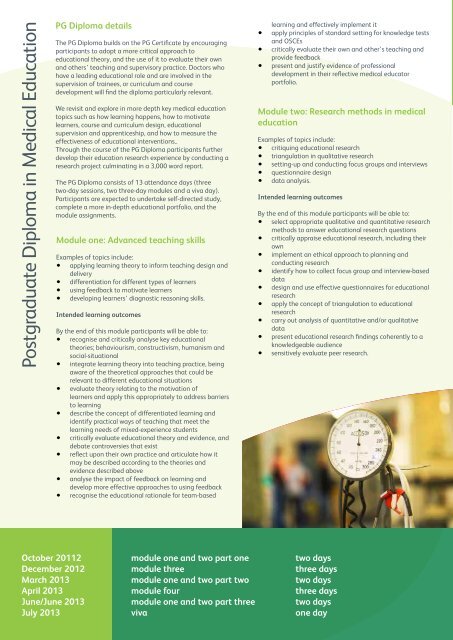MSc in Medical Education 2013/14 prospectus - Royal College of ...
MSc in Medical Education 2013/14 prospectus - Royal College of ...
MSc in Medical Education 2013/14 prospectus - Royal College of ...
You also want an ePaper? Increase the reach of your titles
YUMPU automatically turns print PDFs into web optimized ePapers that Google loves.
Postgraduate Diploma <strong>in</strong> <strong>Medical</strong> <strong>Education</strong>PG Diploma detailsThe PG Diploma builds on the PG Certificate by encourag<strong>in</strong>gparticipants to adopt a more critical approach toeducational theory, and the use <strong>of</strong> it to evaluate their ownand others’ teach<strong>in</strong>g and supervisory practice. Doctors whohave a lead<strong>in</strong>g educational role and are <strong>in</strong>volved <strong>in</strong> thesupervision <strong>of</strong> tra<strong>in</strong>ees, or curriculum and coursedevelopment will f<strong>in</strong>d the diploma particularly relevant.We revisit and explore <strong>in</strong> more depth key medical educationtopics such as how learn<strong>in</strong>g happens, how to motivatelearners, course and curriculum design, educationalsupervision and apprenticeship, and how to measure theeffectiveness <strong>of</strong> educational <strong>in</strong>terventions..Through the course <strong>of</strong> the PG Diploma participants furtherdevelop their education research experience by conduct<strong>in</strong>g aresearch project culm<strong>in</strong>at<strong>in</strong>g <strong>in</strong> a 3,000 word report.The PG Diploma consists <strong>of</strong> 13 attendance days (threetwo-day sessions, two three-day modules and a viva day).Participants are expected to undertake self-directed study,complete a more <strong>in</strong>-depth educational portfolio, and themodule assignments.Module one: Advanced teach<strong>in</strong>g skillsExamples <strong>of</strong> topics <strong>in</strong>clude:• apply<strong>in</strong>g learn<strong>in</strong>g theory to <strong>in</strong>form teach<strong>in</strong>g design anddelivery• differentiation for different types <strong>of</strong> learners• us<strong>in</strong>g feedback to motivate learners• develop<strong>in</strong>g learners’ diagnostic reason<strong>in</strong>g skills.Intended learn<strong>in</strong>g outcomesBy the end <strong>of</strong> this module participants will be able to:• recognise and critically analyse key educationaltheories; behaviourism, constructivism, humanism andsocial-situational• <strong>in</strong>tegrate learn<strong>in</strong>g theory <strong>in</strong>to teach<strong>in</strong>g practice, be<strong>in</strong>gaware <strong>of</strong> the theoretical approaches that could berelevant to different educational situations• evaluate theory relat<strong>in</strong>g to the motivation <strong>of</strong>learners and apply this appropriately to address barriersto learn<strong>in</strong>g• describe the concept <strong>of</strong> differentiated learn<strong>in</strong>g andidentify practical ways <strong>of</strong> teach<strong>in</strong>g that meet thelearn<strong>in</strong>g needs <strong>of</strong> mixed-experience students• critically evaluate educational theory and evidence, anddebate controversies that exist• reflect upon their own practice and articulate how itmay be described accord<strong>in</strong>g to the theories andevidence described above• analyse the impact <strong>of</strong> feedback on learn<strong>in</strong>g anddevelop more effective approaches to us<strong>in</strong>g feedback• recognise the educational rationale for team-basedlearn<strong>in</strong>g and effectively implement it• apply pr<strong>in</strong>ciples <strong>of</strong> standard sett<strong>in</strong>g for knowledge testsand OSCEs• critically evaluate their own and other’s teach<strong>in</strong>g andprovide feedback• present and justify evidence <strong>of</strong> pr<strong>of</strong>essionaldevelopment <strong>in</strong> their reflective medical educatorportfolio.Module two: Research methods <strong>in</strong> medicaleducationExamples <strong>of</strong> topics <strong>in</strong>clude:• critiqu<strong>in</strong>g educational research• triangulation <strong>in</strong> qualitative research• sett<strong>in</strong>g-up and conduct<strong>in</strong>g focus groups and <strong>in</strong>terviews• questionnaire design• data analysis.Intended learn<strong>in</strong>g outcomesOctober 20112 module one and two part one two daysDecember 2012 module three three daysMarch <strong>2013</strong> module one and two part two two daysApril <strong>2013</strong> module four three daysJune/June <strong>2013</strong> module one and two part three two daysJuly <strong>2013</strong> viva one dayBy the end <strong>of</strong> this module participants will be able to:• select appropriate qualitative and quantitative researchmethods to answer educational research questions• critically appraise educational research, <strong>in</strong>clud<strong>in</strong>g theirown• implement an ethical approach to plann<strong>in</strong>g andconduct<strong>in</strong>g research• identify how to collect focus group and <strong>in</strong>terview-baseddata• design and use effective questionnaires for educationalresearch• apply the concept <strong>of</strong> triangulation to educationalresearch• carry out analysis <strong>of</strong> quantitative and/or qualitativedata• present educational research f<strong>in</strong>d<strong>in</strong>gs coherently to aknowledgeable audience• sensitively evaluate peer research.Postgraduate Diploma <strong>in</strong> <strong>Medical</strong> <strong>Education</strong>Module three: Course and curriculumdesign <strong>in</strong> medical educationExamples <strong>of</strong> topics <strong>in</strong>clude:• theories and models <strong>of</strong> course and curriculum design• practical and political considerations <strong>in</strong> curriculumdesign• creat<strong>in</strong>g and lead<strong>in</strong>g change <strong>in</strong> curricula• course and curriculum evaluation• leadership roles <strong>in</strong> medical education.Intended learn<strong>in</strong>g outcomesBy the end <strong>of</strong> this module participants will be able to:• identify different theoretical and philosophicalapproaches to the development <strong>of</strong> a curriculum• analyse factors contribut<strong>in</strong>g to the differences betweenthe planned, taught and learnt curriculum• recognise the importance <strong>of</strong> assessment methods <strong>in</strong>align<strong>in</strong>g hidden and <strong>in</strong>tended curricula and address<strong>in</strong>gbarriers to learn<strong>in</strong>g• consider the impact <strong>of</strong> external agencies on the contentand delivery <strong>of</strong> undergraduate and postgraduatemedical curricula• tackle the challenges specific to multidiscipl<strong>in</strong>aryeducation <strong>in</strong> health care sett<strong>in</strong>gs• identify processes and challenges <strong>in</strong> the development<strong>of</strong> current undergraduate and postgraduate medicalcurricula• design a course with these criteria <strong>in</strong> m<strong>in</strong>d• recognise the educational rationale for problem-basedlearn<strong>in</strong>g and effectively implement it• evaluate an exist<strong>in</strong>g curriculum and makerecommendations for its improvement.Module four: Advanced Cl<strong>in</strong>ical <strong>Education</strong>Examples <strong>of</strong> topics <strong>in</strong>clude:• critical review <strong>of</strong> workplace-based learn<strong>in</strong>g• evaluation <strong>of</strong> appraisal and assessment <strong>in</strong> theworkplace• improv<strong>in</strong>g educational supervision• teach<strong>in</strong>g pr<strong>of</strong>essionalism, communication skills andcl<strong>in</strong>ical skills• develop<strong>in</strong>g cl<strong>in</strong>ical reason<strong>in</strong>g <strong>in</strong> tra<strong>in</strong>ees.Intended learn<strong>in</strong>g outcomesBy the end <strong>of</strong> this module participants will be able to:• <strong>in</strong>tegrate theory and evidence <strong>in</strong>to the practice <strong>of</strong>teach<strong>in</strong>g, assess<strong>in</strong>g and supervis<strong>in</strong>g medical tra<strong>in</strong>ees• draw on educational theory to <strong>in</strong>form the teach<strong>in</strong>g <strong>of</strong>communication skills, medical ethics, pr<strong>of</strong>essionalismand cl<strong>in</strong>ical reason<strong>in</strong>g• analyse the impact <strong>of</strong> personality and environment onworkplace-based learn<strong>in</strong>g and simulation• critically evaluate theory, evidence and approaches toworkplace-based education, <strong>in</strong>clud<strong>in</strong>g role modell<strong>in</strong>g si• use knowledge <strong>of</strong> literature relat<strong>in</strong>g to workplace-basededucation, and reflection on their experience, to selecteducational methods appropriate to the new challenges<strong>of</strong> chang<strong>in</strong>g practice• critically evaluate their own and other’s supervisorypractice• <strong>in</strong>tegrate personal experience and educational theoryto improve support and supervision <strong>of</strong> junior colleagues.VivaParticipants will ma<strong>in</strong>ta<strong>in</strong> a reflective portfolio<strong>of</strong> their educational activities throughout theyear and undergo a circuit <strong>of</strong> face-to-facem<strong>in</strong>i-vivas. Dur<strong>in</strong>g each viva the exam<strong>in</strong>er willask the participant to use their portfolio todiscuss evidence <strong>of</strong> their competence <strong>in</strong> areas<strong>of</strong> educational practice and to discuss theoryand evidence that <strong>in</strong>forms their practice.AssessmentThe PG Diploma is assessed by three writtenassignments (two 3,000 word reports and a3,000 word educational research project), anda viva based on a reflective educationalportfolio ma<strong>in</strong>ta<strong>in</strong>ed throughout the diplomayear.
















